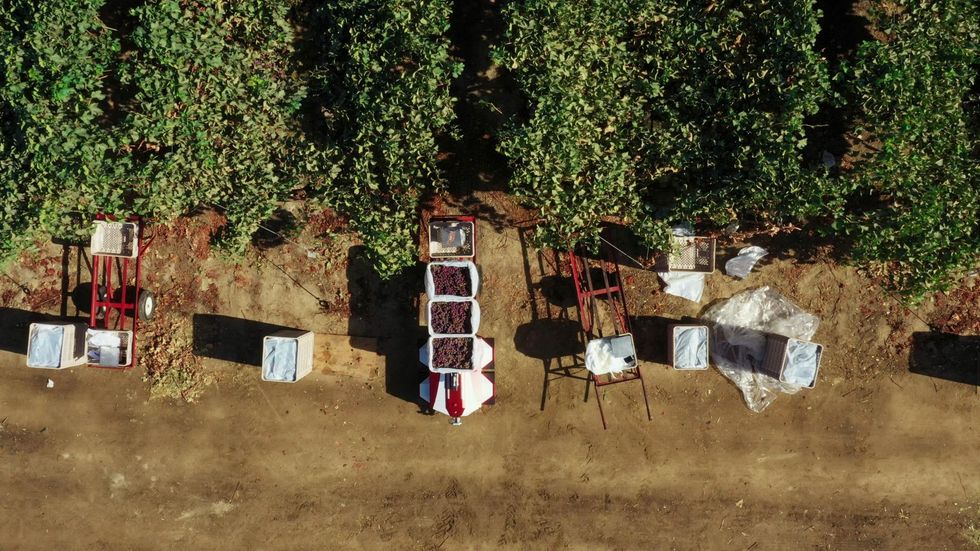This January, John McElhone moved to Santa Monica from, as he described it, “a tiny farm in the absolute middle of nowhere” in his native Northern Ireland, with the goal of growing the crop-monitoring tech startup he founded.
It looks like McElhone’s big move is beginning to pay off: His company, CropSafe, announced a $3 million seed funding round on Tuesday that will help it develop and scale its remote crop-monitoring capabilities for farmers. Venture firm Elefund led the round and was joined by investors Foundation Capital, Global Founders Capital, V1.VC and Great Oaks Capital, as well as angel investors Cory Levy, Josh Browder and Charlie Songhurst. The capital will go toward growing CropSafe’s six-person engineering team and building up its new U.S. headquarters in Santa Monica.
The nascent agtech company began in 2019 as a project between McElhone and his co-founder and high school classmate, Micheál McLaughlin. Growing up in the Northern Irish countryside, the pair developed an interest in technology, which led to ideas about how such technology could aid the agricultural communities they were raised around.
“We noticed that there was a lot of really new, cool technology coming into the farming market at the time,” McElhone told dot.LA. “But every single farmer in our area hadn't a clue how to get started with all this new fancy technology, because they would have to go to training sessions or learn how satellite imagery from NASA works. And farmers—their job is to farm, not to interpret data.”
The first version of CropSafe’s software aimed to bridge that gap. At its core, the platform is an interpretation engine that scrapes and parses through troves of weather data and satellite imagery to find the information that farmers need to grow and harvest more effectively. “CropSafe did that work for you and spots useful nuggets like, ‘Hey, there's blight in field no. 14; here's the exact location and what you need to do next,’” McElhone explained.
But the project, which began simply as a tool for friends and family in Northern Ireland, started drawing attention from users around the world; to the founders’ surprise, people began offering to pay for the service. “That was kind of a turning point—realizing it wasn't just our 200 people that wanted to use it,” McElhone said. So he packed his bags and moved to Southern California at the start of this year to try to build out the software in one of agtech’s hottest markets.
McElhone and McLaughlin now believe there’s a better way forward that would position CropSafe as more akin to a fintech platform for farmers: Because the software collects so much data on farms, it can offer insights into removing bottlenecks that farmers could leverage to secure crucial financing for equipment and other needs.
“If a farm is leasing three combines this year, with the data we have on that farm [and its] crops, we might be able to say: ‘Hey, if you lease an additional combine this year, we know that you will produce so-and-so additional yield and produce $25,000,’” according to McElhone. In an ideal scenario, CropSafe could allow the financing for that combine to be approved instantly on the strength of the data on its platform; the farmer clicks a button on the app, and the combine gets delivered the next day.
So far, McElhone is tight-lipped about partnerships in this area of its business, but said announcements should be coming this summer. The company is also considering offering farmers insights into the best times and places to sell crops, with CropSafe taking a small cut of revenues for the service. (The idea is that farmers would only pay when they see increased sales from using CropSafe’s insights, McElhone said.)
But the move to Santa Monica has already proven fertile for the company, which is planning to announce partnerships with other agtech companies that would allow CropSafe to act more as an operating system—one connecting autonomous tractors, weathers sensors, and other “internet of things” technologies to ensure better, more sustainable crops. With local startups like Future Acres and Abundant Robotics already operating in the space, CropSafe seems poised to benefit from Southern California’s position as a hub for agtech in the U.S.


 Future Acres designed their new robot, Carry, to lug boxes of produce from the fields to the sorting departments.
Future Acres designed their new robot, Carry, to lug boxes of produce from the fields to the sorting departments. Future Acres designed their new robot, Carry, to lug boxes of produce from the fields to the sorting departments.
Future Acres designed their new robot, Carry, to lug boxes of produce from the fields to the sorting departments.